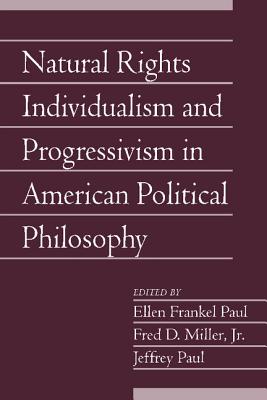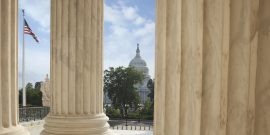The Constitution’s original meaning provides a judicially manageable line between constitutional and unconstitutional delegations.
Debating the Terms of the American Founding
Eleven insightful contemporary scholars of American political thought create a dialogue concerning the natural rights origins of America and its Progressive transformation. The first five essays (Thomas West, Paul Rahe, Craig Yirush, Bradley Thompson, and Eric Mack) deal with the “natural rights individualism” of the founders and the political philosophers who influenced them, principally Locke and Montesquieu, and, according to the editors, “the culmination of this tradition in the writings of nineteenth-century individualists such as Lysander Spooner.” The remaining six (James Ceaser, Eldon Eisenach, Tiffany Miller, James Ely, Adam Mossoff, Ronald Pestritto, and Michael Zuckert) consider the assault on natural rights in the Progressive understanding. Fundamental differences emerge among these scholars over how the historically-bound Progressives deviate from the natural-rights based founders. What makes this collection uniquely worthy is its thorough approach to texts and history. Thus we see [contrasting] Lockes, Wilsons, Deweys, and founders, libertarians versus conservatives, disagreements over how the Progressives erred, and various Straussians arrayed in a kind of natural right fight club.
The essays point to a problem, only alluded to, of governing a regime of individual rights. How does legitimate government arise? From the account we see of the Revolution and the founding, the Declaration would be, as Lincoln put it, a “merely revolutionary document”—not an “abstract truth,” the truth of human equality, from which all other political, moral, and social goods are derived. A fuller account of the founding would require scholarship such as James Stoner’s common law essay here. But the book’s title reads “Natural Rights Individualism”—not “Natural Rights Constitutionalism.” Thus the editors claim that natural rights individualism culminates in abolitionist (and anarchist) Spooner. But, in effect, Spooner is a moocher—e.g., attacking the government-run Post Office, after the founders did the heavy lifting of defeating the British Empire and Lincoln defeated the secessionists and reaffirmed the founders.
Thus, one key question of the book is “Who is John Locke?” Thomas West explicates Locke, the philosopher of America, of revolution, of natural rights, and of the social contract, as comparable to Plato in his complexity. His Locke, like Aristotle, is to be understood primarily terms of a teaching about human happiness, as the complete human good, through observing the reason taught by the law of nature. In contrast to Thomas Pangle, who contends that “’Preservation is the regulatory principle for happiness’ in Locke,” West argues “the opposite: happiness is the regulatory principle for preservation….” But what of Leo Strauss’s characterization of Locke in such statements as, “Locke is a hedonist”; “the negation of nature is the way toward happiness”; “Life is the joyless quest for joy.” In a subsection of his essay, “Why Locke Uses Bad Arguments,” West ingeniously argues that Strauss deliberately exaggerates Locke’s “hostility of nature” and his difference from the ancients. Locke and the ancients are agreed on the summum bonum of philosophy. Liberty provides different means for activities short of complete happiness. Hence West’s Locke sought to reinforce the reasonable conventions of society, while enabling men to protect their political liberty against tyranny.
With a similar purpose, Adam Mossoff seeks to distinguish Locke’s labor theory of value from that of Karl Marx. Most usefully and nobly, Mossoff quotes Cicero from De Officis: “nothing more pernicious can be introduced into human life” than “separating virtue from expediency.” In distinguishing Lockean intellectual property rights argument from Marx’s materialistic understanding, his essay provides Lockean background to Madison’s formulation: “In a word, as a man is said to have a right to his property, he may be equally said to have a property in his rights.”
Consider Michael Zuckert’s rather different Locke, who might favor a powerful government, once legitimately established by consent. We hear the Madison of Federalist 51 in Zuckert’s account: “you must first enable the government to control the governed; and in the next place oblige it to control itself.” The volume’s libertarians view the matter differently. Thus “radical libertarian Lysander Spooner,” in Mack’s account “strikingly Lockean,” rejects Locke’s “manifestly weakest component: Locke’s belief that governments have attained legitimate authority through the consent of the governed.” But what happens when consent is violated? Nullification? Secession? We recall here the words of Lincoln’s First Inaugural: “Plainly, the central idea of secession is the essence of anarchy.” And anarchy is virtually synonymous with despotism.
But is America more than Lockean? Paul Rahe, author of prodigious volumes on modern political philosophy, maintains that Montesquieu “works out the unstated implications of Locke’s argument but goes beyond it entirely….” But he develops these from a “pre-political sociability of man,” not the Lockean account of a state of nature. Montesquieu would have legislators exercise judgment about the peculiar circumstances that a country finds itself in. Monarchies, he notes, may be more friendly to liberty than republics. The prudent mixture of moderation and circumstances will determine this outcome. The founders took Montesquieu’s suggestions to heart in their constitutionalism, their peculiar form of republicanism, representation, separation of powers, and federalism.
The American Revolution was about turning theory into practice. In a careful examination of the documents of the Imperial Crisis (1763-1776), Craig Yirush details how American political consciousness developed from that of British subjects and pleaders for the equal rights of Englishmen to those who championed the natural rights of all men. American colonists used the language of natural rights and the law of nature in their arguments against the Crown. Yirush goes further than other historians in maintaining “Contrary to the claims of some recent scholarship [including Barry Shain!], none of the colonial writings in the imperial crisis spoke of these rights as subordinate to a set of overarching or binding natural law duties.” Individual autonomy was the purpose of the revolution. Similarly, Bradley Thompson argues that the “thinking Revolutionaries” sought the “moral law of nature” that would look past conventions. They agreed that “the political laws of a free and just society should reflect the fundamental moral laws of nature” that are “fixed, absolute, universal, and eternal.” He concludes that the Revolution was about individuals having the right to pursue “their own rational self-interest unhindered by the force or coercion of others” and that “the individual is the primary unit of moral and political value.” Rights are both a license and a fence, to be understood as reciprocal. Thompson focuses on nature, rights, and liberty, and not happiness. Thompson’s Declaration represented “a heroic integration of mind and body. Thus the linchpin that united theory and practice in the Founders’ moral universe was the virtue of integrity—the principle of being principled.”
The Progressive Rejection of the Founding
James Ceaser provides a useful overview of the Progressive critique of the founding. Progressivism sought to delegitimize the Constitution, as an outdated and antidemocratic document, though the book’s various authors dispute whether there was a break or a development. Ceaser draws his understanding of Progressive principles mostly from John Dewey, though he also cites Woodrow Wilson and Franklin Roosevelt. We respect natural rights when Madison’s constitutional government and its principles of self-government are preserved. The metaphysical argument here is that founders held to an unchanging human nature that Darwinian science denied. Darwin liberated minds from the old order: “John Dewey insisted that the concept of nature in any form was dangerous to democracy.” But Dewey would “reconstruct” Americans from the rights-exercising individuals of the Founding era to completely socialized beings molded by modern social sciences.
As Ceaser notes, natural rights have been controversial throughout American political history—recall Confederate Vice President Alexander Stephens’ contempt for the Declaration of Independence and embrace of historical progress. Tiffany Jones Miller picks up on Progressive racism, which also relied on scientific progress. Concluding that human nature was diverse and that races developed differently, Progressives rejected inherent equality of all men. Contrast the Jefferson who believed in racial differences also insisted that morally all men had the same natural rights. Miller properly excoriates the Progressives for their dubious versions of positive freedom and for substituting a socialistic understanding of “general welfare” for individual rights. Here she contends that “The Founders’ conception of freedom is essentially ‘negative’….” Would Miller understand “the pursuit of happiness” in the Declaration of Independence to be a negative freedom—with one defining happiness as one wills—or a positive freedom, to be respected insofar as the freedom results in some version of what true happiness is? Compare Lincoln: “there is no right to do wrong,” and that “right makes might.” Because America is a liberal regime, it assumes freedom and thus appears to embrace negative freedom but always within Lincolnian confines. The profoundest political arguments in America are always about competing versions of positive freedom—ranging from George Washington to Barack Obama.
The book’s remaining essays continue the critique of Progressivism introduced by Ceaser, with Eldon Eisenach, James Ely, and Zuckert all expressing some skepticism about how it deviates from the founding. By contrast, Ronald J. Pestritto argues that the bureaucracies advocated by Theodore Roosevelt and Wilson undermine Madisonian fears of majority faction and thereby the principle of constitutional goverenment. Pestritto’s Woodrow Wilson and the Roots of Liberalism, a thorough study of his break with the founders, reexamines Wilson’s relevance and overthrows the standard portrayal of him as “conservative.” “Wilson could reconcile expert or elite governance with democratic theory because, for him, elites are able to discern the public’s objective mind better than the public itself,” which is not to be confused with mere majorities—i.e., the winners of elections.
While affirming the distinctions between founders and Progressives, others note significant continuities. Objecting to a radical division between the founders and Progressives, Eisenach maintains that Dewey’s communitarianism is a perfection of the founders’ freedom. Progressivism replaced “the American national regime of ‘courts and parties’” with national institutions of direct democracy, a growing administrative state, centralized executive control, ambitious social science, and a living Constitution. He argues that the progressives were Tocquevillean in the sense that they wished to restore the sovereignty of the people by diminishing political parties but deepening the notion of the state or the public. Likewise, in its assault on property rights and individualism, and its confidence in regulation and suspicion of the courts, Ely submits that the Progressive legacy was “decidedly mixed.” Ely unearths a chilling1912 novel, published anonymously by future Wilson “alter ego” Colonel House, Philip Dru, Administrator: A Story of Tomorrow, 1920-1935. Defeating by military force a constitutional coup, Dru assumes dictatorial powers, proclaims himself Administrator of the Republic, and proceeds to implement the Progressive agenda. “[T]he work affords troublesome insight into the Progressive mindset.”
Michael Zuckert’s concluding essay challenges almost all the others on the books themes. He favorably cites Herbert Storing, an admirer of the British civil service for putatively aristocratic qualities, in defending Wilson as “building upon and to some extent restoring the work of the Founders.” Thus, against Pestritto (as well as Charles Kesler, Robert Eden, and John Marini), he understands Wilson as merely applying the Declaration to new social conditions. He is simply being a cautious Burkean (but recall Strauss’s charge of historicism against Burke). “[T]he new freedom” required “more positive government, more tasks to be done, and a government better fitted to them.” Thus, Wilson divided politics and administration for the sake of “positive governance” and democratic responsibility. His misguided desire to eliminate the separation of powers should be understood in this light. Wilson wants to liberate America from “laissez-faire orthodoxies” and “empower needed governmental action” and so “gives up the guidance these rights [natural rights] supply”—which we saw in his interpretation of Locke. No wonder Zuckert dismisses as “zombies” the Progressives’ recent resurrection in the political battles between left and right.
The enduring struggle in the book reminds one of Nietzsche’s dismissal of the notion of a common good as inherently contradictory. This is the old tension between the noble and the just, the subjects of political science for Aristotle. But politics requires both, in addition to practical wisdom (phronesis). In this view, it makes more sense to rely on divine revelation than on spontaneous order to produce the best practicable regime.


